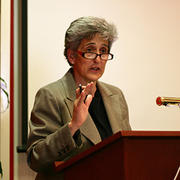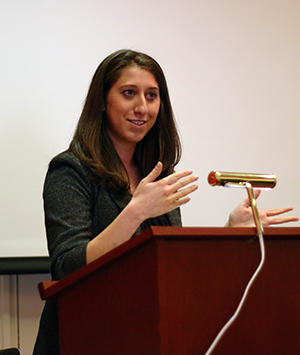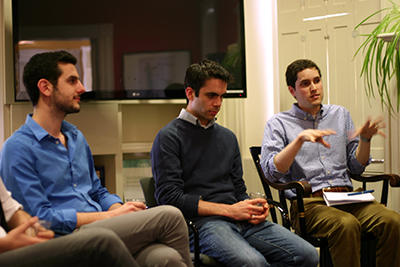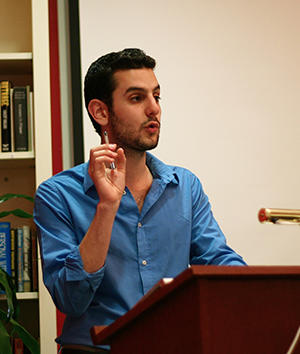
On May 2, 2013, second-year CMES Master’s students presented their thesis projects to an audience of fellow students, faculty, and other members of the CMES community. Their projects represented a range of topics and source material, from archival research into the founding of a business school in Beirut in 1900 to interviews with Syrian refugees living in Jordan in the summer of 2012.
The Master’s thesis, an optional component of CMES’s two-year Master’s degree program in Regional Studies—Middle East, is an original, scholarly essay that is based partially on primary source material, usually historical documents or notes from ethnographic fieldwork. Students who choose to write a thesis, an undertaking requiring considerable time and energy on a relatively short timeline, often do so in preparation for advanced graduate work in a PhD program. These students generally use the summer between their first and second years in the program to conduct primary research, and work with a thesis advisor who supervises the research and writing of the thesis for the duration of the project.
Susan Kahn, CMES associate director and director of the AM program, notes, "The thesis is expected to articulate and argue important questions and to be situated within an ongoing scholarly discussion. It is assumed that the thesis will include original research in primary sources, and that it will successfully challenge conventional wisdom and open new doors. It is hoped that the thesis will be of suitable quality for submission to scholarly journals."
This year saw a relatively large number of students—eight out of eleven graduates—choosing to write a thesis. Their presentations highlighted the diversity of interests represented by the students in CMES’s multi-disciplinary AM program:
 Rachel George’s thesis examines the ratification of international human rights treaties, particularly the case of states in the Middle East and North Africa (MENA) region who have ratified some but not all of the five core human rights treaties. Entitled “The Limits of International Human Rights Law: Ratification Politics in Selective Signatory States in MENA,” Rachel’s thesis looks at the cases of three of these “selective ratifiers” (Saudia Arabia, Iran, and Oman), which have made strikingly different choices on which treaties to ratify, seeking to discover the political drivers and implications of their differing selections, and to offer a theory of regime intent. (Rachel will begin a PhD in International Relations at the London School of Economics in the fall.)
Rachel George’s thesis examines the ratification of international human rights treaties, particularly the case of states in the Middle East and North Africa (MENA) region who have ratified some but not all of the five core human rights treaties. Entitled “The Limits of International Human Rights Law: Ratification Politics in Selective Signatory States in MENA,” Rachel’s thesis looks at the cases of three of these “selective ratifiers” (Saudia Arabia, Iran, and Oman), which have made strikingly different choices on which treaties to ratify, seeking to discover the political drivers and implications of their differing selections, and to offer a theory of regime intent. (Rachel will begin a PhD in International Relations at the London School of Economics in the fall.)- Brett Levi won the CMES AM Thesis Prize for his paper “Hasidic Geopolitics and the Greater Land of Israel: Israeli Hasidic Rebbes Encounter the West Bank, Gaza and Territorial Withdrawal, 1982-2013.” For his research into the views of Israeli Hasidic rebbes on Jewish settlement in the West Bank and Gaza, Brett visited insular Hasidic communities across Israel to find primary documents from the last thirty years. Those source documents, including Hebrew and Yiddish-language books, editorials, and sermons, indicate a range of shifting rabbinic views: while some rebbes have opposed settlement activity, many more have promoted it, which Brett cites as a leading cause for the fact that ultra-orthodox Jews now comprise one third of the Jewish settler population. (Read more about Brett's project here.)
- Salmaan Mirza’s project, “The Gospel of Business Education,” looks at the formation of the one of the first global business schools, established at the Syrian Protestant College in 1900, based on archival material from Beirut. In his paper, Salmaan examines the link between nineteenth-century American entrepreneurship, Protestant missionary work, and late Ottoman Levantine modernization.
 He concludes that while “commercial education and Christianity” were a central part of a spiritual proselytizing mission, 17-21 year old Syrian students dreamed of emulating an American doctrine of “free enterprise” for their own material benefit. (Salmaan will continue his graduate studies at CMES next fall in the History and Middle East Studies PhD program.)
He concludes that while “commercial education and Christianity” were a central part of a spiritual proselytizing mission, 17-21 year old Syrian students dreamed of emulating an American doctrine of “free enterprise” for their own material benefit. (Salmaan will continue his graduate studies at CMES next fall in the History and Middle East Studies PhD program.) - Reina Saiki, noting the relatively short lifespan of most terrorist organizations, wrote a thesis entitled “How Terrorism Endures: Factors that Affected the Longevity of the Kurdistan Worker’s Party (PKK).” Her paper considered contributing factors on four levels: individual, organizational, regional, and global. For the first two levels she conducted on-the-ground research, traveling twice to Iraqi Kurdistan and once to southeastern Turkey to interview current and former guerrillas, former non-guerrilla PKK members, PKK supporters, journalists, activists, and party officials.
- Alexander Shams interviewed approximately twenty-five women in Tehran, Iran during the summer of 2012, all of whom had pursued higher education in the late 1980s and early 1990s, for his thesis project. Part of the first generation of women to be schooled after the 1979 Revolution, the majority of the interview subjects were also the first women in their families to attend a university. In his paper, “Daughters of the Iranian Revolution: Women’s Experiences of Increased Access to Higher Education in the Islamic Republic, 1987-1997,” Alex argues that during this period, university education increasingly became defined as an Islamic right, and that even as the state policed and regulated women's presence in the public sphere along vaguely defined "Islamic lines," it also intervened against patriarchal limits within the family by advocating for women's rights to education, work, and the public sphere more broadly through an Islamic idiom.
 Hassan Shiban’s thesis, “Redefining Syrian Identity in the Diaspora: A Glimpse into the Lives of Syrian Refugees in Jordan June-July, 2012,” is based on interviews with Syrian refugees in Jordan that he conducted during summer of 2012. His paper explores a range of issues including refugees' coping mechanisms in light of difficult humanitarian circumstances, their attitudes towards the conflict in Syria, specific problems faced by segments of the Syrian diaspora, and the role refugees may play in redefining and setting the boundaries of a future Syrian identity.
Hassan Shiban’s thesis, “Redefining Syrian Identity in the Diaspora: A Glimpse into the Lives of Syrian Refugees in Jordan June-July, 2012,” is based on interviews with Syrian refugees in Jordan that he conducted during summer of 2012. His paper explores a range of issues including refugees' coping mechanisms in light of difficult humanitarian circumstances, their attitudes towards the conflict in Syria, specific problems faced by segments of the Syrian diaspora, and the role refugees may play in redefining and setting the boundaries of a future Syrian identity.- Rustin Zarkar’s project examines political ephemera: a collection Iranian political posters produced by the Fada’i-e Khalq, a Marxist-Leninist guerrilla organization that was active in Iran during the 1970s. Entitled “Building an Insurgent Consciousness: Political Posters of the Fada’i-e Khalq (1978-80),” his paper is a tripartite analysis focusing on the material, presentational, and visual forms of the poster object in order to elucidate the political realities and ideological nuances of the 1979 Revolution. (Rustin will begin a PhD program at NYU in the Fall of 2013).
- John Zavage, who graduated from the AM program in the fall of 2012, presented his thesis “More Than Just Sunnis, Shi’ites and Kurds: A Flawed Constitution, the Failure of Parliamentary Oversight and the Rise of Nuri Al-Maliki in Iraq” in December 2012. Inspired by observations made during deployments to Iraq with the U.S. Army in 2008 and 2010, John’s project analyzed the founding documents of the Iraqi opposition, the 2005 constitution, and the legislative and electoral history of the Iraqi democracy through 2012 for trends indicating a tendency by the country’s leadership towards authoritarianism despite a nominal commitment to democratic values. An abridged version of his thesis was published in the Defense Institute of Security Assistance Management Journal of International Security Cooperation Management. (John is currently working for the Security Cooperation division of the USCENTCOM (U.S. Central Command) headquarters at MacDill Air Force Base in Florida.)
